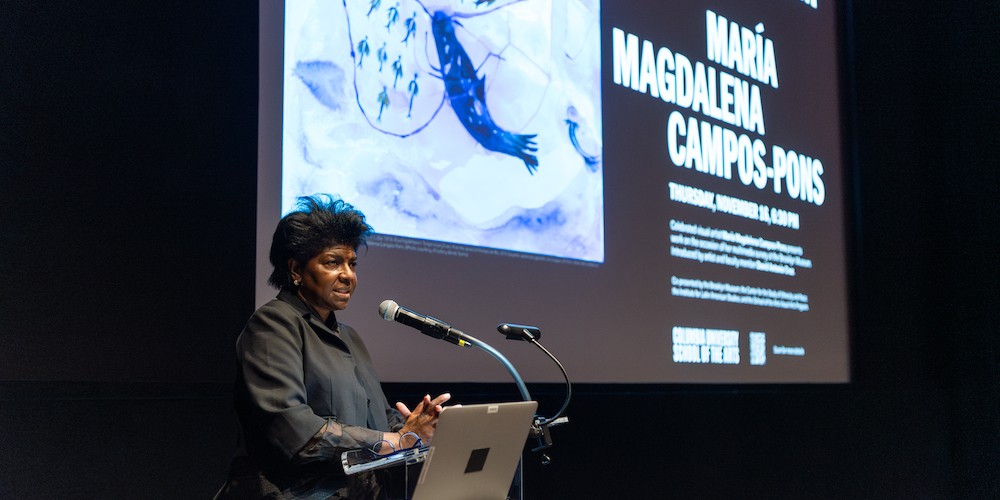A Visionary Voice: María Magdalena Campos-Pons Presents Body of Work
The power of ancestral lineage—the beauty and awe of drawing connections with a wide span of geographies—animates the works of Cuban-born artist and 2023 MacArthur Fellow María Magdalena Campos-Pons. From video installations to sculpture to photography, Campos-Pons’s artistic explorations celebrate the rich history of her family, contributing to the ongoing narrative of their legacy while allowing Campos-Pons to examine material reality, cultural heritage, and spiritual practices.
Campos-Pons discussed her four decades of artwork on November 16, 2023 during a dynamic lecture held at Columbia University School of the Arts’s Lenfest Center for the Arts. The event coincided with the Brooklyn Museum’s ongoing exhibition titled María Magdalena Campos-Pons: Behold, which showcases Campos-Pons’s visionary voice across mediums. Campos-Pons’s “prescient and sensorial” depictions of diaspora and memory draw from her family story to investigate “the global histories of enslavement, indentured labor, motherhood, and migration,” according to the museum.
Campos-Pons began her presentation by inviting the audience to share a small yet powerful gesture—inhaling and releasing a deep breath. “We all need air to breathe,” she said. “We all have the right, the necessity, to have a place that we call home.”
Campos-Pons noted the “profound solidarity” she has for “anybody hurting in any place,” and offered a reflection on the intricacies of her navigation of her identity, with her heritage in Africa, China, and Spain, among other countries. Campos-Pons described her dedication to finding language for the textual materiality of art—for her conclusions, her inquiries, her perceptions.
“What does it mean to be a Black woman? A person born in the Caribbean, a person part of a multitude of identities?” Campos-Pons said. “I found radical contradictions about understanding and acceptance. Those feelings and those questions were very present when trying to find the language to narrate a very particular history, and trying to insert that narrative in the long history of human experience elsewhere. Dualities and complexities have been very important in my career and in my effort to find language.”
Campos-Pons introduced her artistic exploration of natural landscapes. She described gardens as timeless “spaces of contemplation,” sharing photographs from her time in the northwest of Italy, before focusing on specific pieces that evoke a collision of different histories and times “in beautiful ways.”
Campos-Pons’s installation, The Herbalist’s Tools, pays homage to her father, who was an herbalist. The piece centered three trees sacred to Cuba: the ceiba, the royal palm, and the almacigo. A wooden column represented each tree, while the deep green walls of the exhibit featured drawings of plants and frames of live, scented herbs from Cuba.
To honor her mother, Campos-Pons created Backyard Dreams, a photograph of the artist and her son in a garden against a painting made by the artist of her mother. The flowers are pink and red and blue, while Campos-Pons’s mother’s pearly white necklace and flowing dress evoke elegance and care.
“Spirituality and ancestral traditions are very vivid, very alive in [my work],” Campos-Pons said. “I again come to this structure of past, present, and future. I again come to my lineage, the past. I am trying to build on this continuum, this replenishing in the present. I am holding in my heart that my son will keep going on with this in the future.”
After noting the permeation of Yoruba traditions across the Americas and its influence on her work, as well as her meditations on displacement and reproductive labor, Campos-Pons highlighted a specific piece titled, Soy una fuente (I Am a Fountain). The piece features colorful, disembodied organs: a tear-spilling eye, milk-pumping breasts, a beating heart inscribed with words such as “blood,” “life,” “milk,” and “thoughts.”
“I Am a Fountain came from Clarice Lispector, the great Brazilian writer. In a novel she describes the woman-body as a fountain,” Campos-Pons said. “I was so moved by that idea. That I am a fountain, that we could be a fountain. I don’t want to use limited views about women’s reproductive capacities. I want women to be as we are, full of ideas and aspirations. Part of [being a woman] is being a fountain, a source for creativity.”
Across all of her creations, Campos-Pons invites viewers to contemplate the profound narratives embedded in each painting, each performance, each photograph. Traversing the worlds of her art entails a deeply felt questioning of and an appreciation for the interconnectedness of the human experience.
The event was co-presented by the Brooklyn Museum; the Center for the Study of Ethnicity and Race; the Institute for Latin American Studies; and the School of the Arts Visual Arts Program. María Magdalena Campos-Pons: Behold is on display at the Brooklyn Museum until January 14, 2023.
